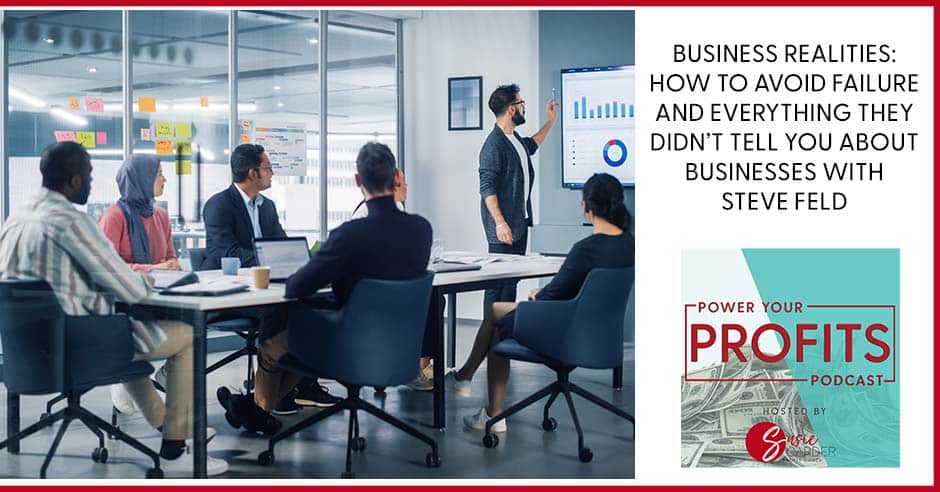
While we have heard of many business success stories, the number of failing businesses are actually larger – and at this rate, it’s becoming horrific. In this episode, Susie Carder engages in an open and honest conversation with MBA business marketing strategist Steve Feld about why businesses often fail and what realistic actions entrepreneurs have to take in order to actually thrive in the market. Tune in and learn how to really understand how business works, and actually realize your dreams and goals as an entrepreneur!
—
You’re going to love our guest. Steve Feld is an MBA, business marketing strategist, author, award-winning business management executive, and most importantly, coffee enthusiast. He has worked with over 600 business owners. Steve has owned, operated, and built seven businesses providing change management process improvement to three other companies. He’s been part of three Fortune 500 companies and is writing his eighth book which is ready to be published.
—
Welcome, Steve. I’m so excited that you’re here. For those of you that don’t know Steve, share with people what your magic is, what your juice is, and how you serve the market.
I found my passion. My passion lies in working with owner-operators for businesses. The failure rate for business owners is horrific in my world. It drives me nuts. The reason it does is that most business owners don’t know the business. They know their craft and their technique. I’ve owned and operated seven businesses and turned three others around. I’m here to help them so they can realize their goals and dreams, and why they became an entrepreneur.
Sometimes you don’t know. You’re like, “I didn’t want anybody to be the boss of me. That’s why.”
It goes deeper than that. There’s so much more. If you’re going to put some sweat equity into this thing, make sure you have an exit strategy so you get paid at the end.
Do you have a niche that you work in, or do you work with entrepreneurs that are doing six figures? Who is that person?
I have different levels because I have an automated program for startups, which is perfect for them. It fits right into their schedule, finances, and everything. I have group coaching. Those business owners are usually doing about a couple hundred thousand to maybe $1 million or so. I have one-on-one coaching, and then a mastermind group. My clients range anywhere from startups to $150 million.
That’s a big number.
It’s a big range.
There are a lot of zeroes.
When you get to the $10 million and even $70 million, $80 million, or $90 million, they still have problems. The problems just have more zeroes behind them.
That’s what I always tell my students. I’m like, “The difference between me and you is a couple of zeros. It’s the same but different.” What’s the best thing you like about working with entrepreneurs and business owners?
The very best thing is they realize their goals and dreams. They don’t have to get divorced over their business money issues. They’re getting to take vacations, which most business owners don’t do. They get to put money in the bank and get that financial freedom that they’ve dreamt about even when they had a job. That will never give you that financial freedom unless you get one of those jobs. It’s to see and realize that their dreams are becoming reality and they’re helping the community in so many different ways. They don’t realize it’s more than just starting a business. They’re impacting many other things in the world. It’s important.
Give me an example of some businesses that you’ve helped, and what kind of results have you produced for them?
I’ll give you a big one and a little one. How’s that?
That is perfect.
A big one I had was they were doing $73 million. When I first met him, he goes, “I have 84 problems a day.” I go, “You have 84 employees. Next.” I go, “Have you ever looked in a mirror?” He’s like, “Every day.” I go, “Let’s go look in a mirror right now. Do you see yourself in there?” He goes, “Yeah.” I go, “There’s your problem.” It took us three months for him to realize he was the problem, not the 84 employees. Once he woke up, it was like a light bulb went on. After lots of going back and forth, he broke down and cried. He goes, “I am it.” I was like, “Now, we can fix it.”
[bctt tweet=”Go look in a mirror right now. You see who you see in there? There’s your problem. Sometimes you have to realize that you were the problem, not anyone else.” via=”no”]
That’s delicious. That’s a big one with $73 million. What’s the smaller one? It’s probably the same.
I’ll grab one from the pandemic. It is a barbecue restaurant in Texas. It’s like you could walk 200 yards and be at the next barbecue restaurant in Texas. They were having their pandemic hit. They had to shut down their dining room per state law. They called me up, freaking out, and I said, “We can fix this.”
As we were talking, I go, “I get your newsletter once a month. They’re phenomenal. How many people do you have on your newsletter list?” They go, “We’re at around a couple of hundred thousand.” I go, “What?” They go, “We make sure to have everyone at every table sign up for our newsletter. We’ve been doing that, and we do it once a month.” I go, “There’s our money.
I love that because it’s like, “I should do a newsletter, so I’m going to do a newsletter.” They’re not monetizing it and putting great content out, but what else? What you’re telling me is you find money everywhere.
It’s there. I even have a proprietary software program where I can find a business owner anywhere from $50,000 to over $100,000 of hidden revenue in 45 minutes by asking questions.
I love that. What questions does the software ask? You have my curiosity. It’s technology brain.
It’s technology brain because it runs through 497 million algorithms. We can’t do that. I look at twelve different areas of their business right up front. When they become a client, I’ll put them through what I call a deep dive. We look at 40 areas, so then we have a good roadmap. Let’s say one of the areas is your market-dominating position. We all have to have one.
As business owners, we’ve all been to the networking and iHELP. That’s not making your phone ring. If you have a market-dominating position, how will that change your business? You will be shocked. I did this in one business. All we did was change their market-dominating position to make sure the salespeople and all the employees were on the same page. Their business went up 17% in the first 30 days because they all said the exact same thing. All we did was change their market-dominating position. We haven’t done anything else in the business yet.

I always tell my students, “It doesn’t have to be hard. It has to be strategic. Quit pulling stuff out of your hiney. Let’s go do strategy.”
They’re all focused on the tactic. The posting and the emails are tactics. Focus on the strategy. That’s where your eyeballs should be focusing. If you get this right, the tactics will be 20%. It’s the 80/20 Rule. Small business owners flip that. They’re all worried about how 80% is tactics and 20% is strategic.
What happened with the barbecue restaurant? What showed up in the newsletter?
We changed their newsletter to do something fun about barbecue. They’re in Texas, but all their newsletter, we realized, was all over North America. We gave recipes to do with leftovers. The big joke was like, “If for some weird reason you have barbecue leftovers, here’s a recipe to use with it.” That was the ongoing joke.
I had her start doing these short little Facebook Lives that blew up because she was doing them in her home with the recipes. It blew up. One day, she goes, “I’m trying to perfect my grandmother’s matzah ball soup, getting ready for the holidays. I’m thinking of matzah ball soup and brisket beef. What do you think?” It was twenty seconds. She posted it, and there were over 500 orders within the first hour. She hasn’t even made this yet.
It blew up. She had to perfect the recipe to make it in mass quantities. I said, “You still can’t open up. Go talk to the city council about opening up on the sidewalk.” She got sidewalk approval for tables. She started donating and getting active with donating to first responders. That got her a ton of press more than ever but she still couldn’t open the doors. She did curbside service and increased her employees by seven employees because she created her own delivery. She was not using Grubhub and all the others and saved a ton of money. This goes on and on, and still, the doors are closed.
Still?
They’re now open, but during the time I was working with her, no one could walk in. She was working twenty-hour days, seven days a week. 2020 and 2021 were their best years ever and no one walked in the door.
Isn’t that a great story? Those are some good ones. Those are juicy. Many people are struggling. What’s your secret sauce for the entrepreneur? Everyone thinks, “It’s different because it’s COVID.” There’s always some pandemic, some economic crisis, some real estate bubble burst, and this and that. What would you say is the secret sauce? You already alluded to it, but in case people didn’t notice it distinctly, what’s your secret sauce to staying in action and growing the business?
It’s finding opportunities in chaos. I’ve turned around three businesses, and they’re like, “Woe is me.” I said, “You’re going to call me the business interior decorator?” They’re like, “What do you mean?” I go, “I’m going to keep the shell of the business on the outside. Think of a house. I’m going to gut it all out and I’m going to rebuild it. Once I rebuild the interior, I’m going to go out and work on the exterior and make the lawn shiny. That’s my marketing and everything else. Watch everyone start coming in.” That’s how I’ve looked at it.
[bctt tweet=”To stay in action and keep growing your business, find opportunities in chaos.” via=”no”]
There are ways to market. There are ways to improve your operations and process improvement. You got to get the leader or the owner, in my case that I work with. What are their end goals? What are their real goals? What do they want to achieve out of their business? Is it to make money and work? What’s the real reason?
What do you see are the biggest challenges with the entrepreneurs that you’re working with? What are their biggest challenges? Let’s say the top three.
Since I’ve been there and done it, I can tell you that number one is they’re not asking for help. They’re like, “I know how to run my business. I know what I’m doing. No one needs to tell me anything.” No one’s telling you how to run your business. They’re trying to help you improve your business. They’re your coach on the sidelines. They’re not telling you how to do everything. I’ve been there, done it. I was one of those egotistical people saying, “I don’t need any help,” and my business was suffering. Once I got help, I was like, “What happened?”
Part of the challenge of being an entrepreneur, being the same but different, and managing more zeros is there are so many charlatans. You get caught up in the glossy. You get caught up in the pretty or the promise. The promise, which I hate, seems like such bull. Let’s look at the rubber meets the road.
It’s going to be a rough road. It’s going to be a rocky ride. That’s the way it’s going to be. If you don’t have someone being your co-pilot or giving you the map, you’re going to drive off a cliff and not even know it.
[bctt tweet=”If you don’t have someone being your co-pilot or giving you the map, you’re going to drive off a cliff and not even know it.” via=”no”]
Number one is you’re not asking for help. What’s number two?
Number two is hiring wrong.
We’ve all done that.
I say that because a lot of business owners use the mirror test. They’re like, “Put the mirror under your mouth. If it fogs up, you are hired.” I’ve seen that with so many small business owners. In one of my businesses, I was determined. I was like, “I’m going to hire people way smarter than me. I’m going to go and find them. I’m going to pay them extra to be smarter than me,” and I did that.
The next thing I know, my business was growing. Why? I found someone who was better at whatever it was I hired them for. When we did our staff meetings, their ideas were flowing. We were all like, “I have never thought of this.” I’m using their skillset. It’s not an ego thing. They’re not here to take my job. They don’t want my job. They don’t want to run my business. Hire smarter people than you. Get over it.
You got to invest in people. You got to invest in the talent. If they’re good, they pay for themselves inside themselves. It’s scary to go, “I’m going to spend $10,000 on Steve,” and then you’re like, “He’ll make me $1 million.” What is that number and what is the ROI? That’s when I say charlatans because so many people are promising things. Do some due diligence. Did they produce that? Ask hard questions. You can always tell someone who’s full of crap. They start circle-talking you. They can’t give you an example. They can’t give you specifics.
Make sure you do your due diligence, whether it’s me, Steve, or somebody else. Do vocation on what you’re hiring for so you can make sure you’re hiring the best of the best. What is number three? One is you’re not asking for help. Two, you’re hiring the wrong person. What’s the third thing that you’ve seen?
You touched on it. If you can’t measure it, you can’t manage it. How many times do business owners might know their revenue, but when you ask them, “What’s your profit?” they’ll give you the same number? One’s on top. One is what we talk about for show at cocktail parties. One is what you take home to mama. That’s how I look at it.
Who cares? I remember one of my first businesses. We were an award-winning salon and spa. We were in the top 1% of the nation and the top 10% of the world. Every accolade imaginable, we won. We were on the cover of magazines. We did $1 million that year. In the same year, we lost $70,000. I’m like, “This is a shame.” It was the biggest eye-opener to go, “I don’t care about that number. I have no money left. What do I need to do so that I’m not putting in my paycheck?” That’s what I ended up having to do. That $70,000 has to come from somewhere. It has come out from my pocketbook to go, “It does matter. How do I become a profitable business?” Mike Michalowicz’s book, Profit First, I love that book. It has a simple strategy to make that happen.
I couldn’t agree more. There are a lot of businesses that look good on top, but when you look at the bottom line, it’s not a pretty picture.
Profit is where we look at the healthiness and how you’re going to sell your company. If there’s no profit, there’s nothing to sell. That’s when you do an asset sell. You’re going to buy furniture or maybe a database. What would you say is the biggest challenge your own business is facing?
Mine has been the perception. Let’s talk about all the charlatans out there. It’s the perception of, “I hired someone who left their job.” I call it jumping the cubicle. They left their corporate job. They’ve never owned and operated a business, but they’re going to come and tell you and give you advice on your ideas on how to run a business. They hire these people and that coach runs that business into the ground. We who have been there, done it, and are certified and have these proven techniques and all the strategies, it kills us. It puts a bad taste in their mouths. That’s been one of the biggest challenges.
Looking at your business, what have you done to build your own personal wealth in growing businesses to take care of your livelihood? At the end of the day, we don’t want to keep doing this forever. We get to choose to do it, but we don’t want to have to do it. That’s the difference between a job and building wealth. What do you do to build your wealth?
The first thing I learned the hard way was scaling. I have coaches underneath me as well. That’s one way. I then brought multiple streams of revenue into the business. This is what I’m doing with it. I’m not touching it. It’s automated. It’s in the systems. It’s in the process. All I do is look at the numbers once a month. Why? I’m scaling that way. It’s a great way to bring in revenue without you having to work for it. You’re working for it, but not hard like that.
Another thing is I meet with my tax planner or my CPA two times a year outside of tax season. I recommend that to all business owners, and here’s why. That’s the time to make the changes, not in January. They’re swamped. All they’re doing is knocking out returns. That’s the worst time to talk to your CPA. Another thing is to get a tax planner on your side. They have that clairvoyance if you will. I sit with them and my insurance guy all at the same time. I buy them lunch and we review me and my business. It’s worth the price of whatever if they’re going to charge you hourly and it’s worth the lunch. You’re going to get more value because they’re on your team. These are hiring people smarter than yourself.
You outgrow those people, too. I’ve outgrown so many accountants and CPAs. I’m like, “I’m telling you what to do. This is wrong.” I need someone that’s probably bigger than me. I’m not a CPA, although I love the business side of it, the math side of it, and the projections. That’s your job. It’s making sure that you’re looking inside of that to make sure they’re the right person, right?
I agree.
We’re seasoned. What would you do differently in building your wealth, looking back, and being the man you are at the age you are to go, “I wish I would’ve known then.” We all have those stories, but what’s yours?
I’ve built it up and I’ve lost it all. This is the lesson I learned from that one. It was to listen to the smarter people. My financial advisor at that time said, “Do not buy all this stuff.” I went and bought all that stuff, and then the economic downturn hit. I was like, “If I would have listened to him, I would have a much bigger bank account at the end of the day and bigger savings for retirement.” Another thing is I’m a very aggressive person. My portfolio shows it even at my seasoned status. My advisor is like, “We need to move it more conservatively.” I’m like, “Put on the gas.”

That’s our entrepreneurial spirit. We have identical lessons to go, “I’m a tough nut. I’m guessing you’re a tough nut. You can tell me what to do, but I also have to learn the hard way.”
They have clairvoyance because they’ve been there and done it.
They have been there and done it to go, “This one’s a tough nut.” You got to be willing to go through it.
I hired the right people and got the right people on my team for me and my future. I regret always listening to them. If I would’ve listened to them, things would be different.
That’s risk calculation, right?
That is correct.
You listen to them, take it in, and then make a decision. As painful as financially as that was, we learned to do it quicker and faster to go, “I remember that. I’m not going to do that again, but I’ll do this.” It’s not that I like that lesson, but that lesson built character. That lesson built my stamina. It gives some great stories. If you only had wins and you never had failures, you have nothing to compare and appreciate when the wins come.
I agree. When my advisor says, “Let’s do this,” I’m like, “Whatever you say.” He looks at me like, “Are you kidding me?” I’m like, “Whatever you say. I’m going to keep my hand out of the cookie jar right now.”
It’s saying, “I’m going to be obedient.” That was a hard one for me to say, “I’m going to be obedient to this lesson.”
I still ask why they think that. Thank God I hired the right people. They go, “Here’s the result.” I’m like, “Make it happen.”
Let’s say we’re at the end of our seasons. What’s the one thing that Steve wants to be remembered for?
It’s seeing more small businesses survive and thrive and trying to reverse the trend of small business failure, which has not changed since 1932 when they started tracking.
I haven’t heard of that statistic. That’s awesome. How do people get a hold of you? How do they play with you? How do they get the algorithm and the software? My students are juicy. I’m like, “I want to spend 45 minutes with Steve” because I read on your site you could find $10,000 to $100,000. I’m like, “That is worth 45 minutes.”
I’ll be honest. I build a case study on that and I put it in my next book. I got my 7th and 8th book. The seventh book’s done. With the eighth book, my editor’s yelling at me because all I’m doing is finalizing their edit to check it. It’s done. My website is BizCoachSteve.com. Business owners don’t have anyone to talk to a lot of times. You can’t talk to your spouse saying, “I’m having problems at the business,” because all they think is, “How are we going to pay the mortgage?” You can’t tell your employees. Otherwise, they start updating their resume.

I’ve done that one. I freaked them out. I’m like, “I can’t share that with my employees.”
You can’t tell your fellow business owners around you because they’re thinking, “I wonder how much the rent would be if I acquired his space too.” If you have advisors or anything, they will have no confidence in you. They’re like, “We’re advising the wrong person.” What I’ve been doing is saying, “Get on a call for fifteen minutes. You can vent. You’re not going to get judged. I’m not going to sit there and make it a sales call. It’s someone to talk to that understands what you’re going through.” I know what it feels like to wake up at 2:00 AM in a cold sweat, worrying about tomorrow’s payroll. I understand that one. It’s been therapeutic because I am starting to notice that suicide rates for small business owners are increasing, and it’s all over money issues.
It used to be dentists that were the highest ones.
Small Business owners are creeping on up. I get actuaries. I know a lot of actuaries.
You can find Steve at BizCoachSteve.com. Reach out to him. You can follow him on social media as well. Is it the same handle?
Yeah. It’s Biz Coach Steve. I’m on Facebook and LinkedIn. I haven’t looked at Twitter in a while. I started on Instagram. I’m also on YouTube.
You’ve got a great podcast. You’ve got lots of resources. You do your due diligence. Thank you for being here. Thank you for being a champion for small businesses. We need more of us in the world to hold the possibility and not judge us for the stupid things we do but love us through our pain. We’re like, “Show us the money.” That’s my big takeaway from this.
Realize your goals and dreams. You got into business to build something for yourself and your family or your community. Let’s build it.
[bctt tweet=”Realize your goals and dreams. You got into business to build something for you and your family or your community. Come on, let’s do it. Let’s build it.” via=”no”]
If you love this and you love Steve, make sure you hit that like button. Make sure you share on all your platforms because there’s somebody struggling that needs to hear Steve’s message to know that there’s hope and possibility. Until next time. Thank you for being my guest.
Thank you.
You are a badass. I loved having you, and I appreciate playing.
 Steve Feld, MBA, Business Marketing Strategist, Author, award-winning Business Management Executive, and coffee enthusiast. Worked with over 600 business owners. Steve has owned, operated, and build up 7 businesses. Providing change management and process improvement to 3 other companies. Has been part of 3 Fortune 500 companies. Wrote 8 books.
Steve Feld, MBA, Business Marketing Strategist, Author, award-winning Business Management Executive, and coffee enthusiast. Worked with over 600 business owners. Steve has owned, operated, and build up 7 businesses. Providing change management and process improvement to 3 other companies. Has been part of 3 Fortune 500 companies. Wrote 8 books.
COPYRIGHT © 2024 SUSIE CARDER | DESIGNED BY LUTZ MULTIMEDIA LLC